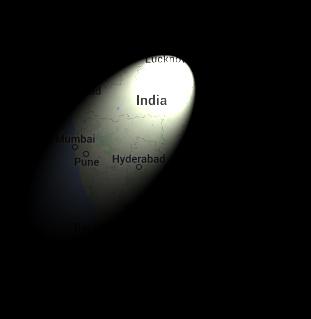
Created by Monica Sarkar. Original image: Google Maps.
I received my first hate mail a few months ago! I know, it’s weird that I feel happy about it, but Winston Churchill’s famous words came into my head: “You have enemies? Good. That means you’ve stood up for something, sometime in your life.”
To be honest, it’s not surprising that I will get on the wrong side of at least a few people, having written a few stories about sensitive topics such as India’s rape crisis, negative religious practices and women’s rights. My article on Indian men’s response to rape in the country fueled the fire of the angry email I received, because the sender felt I was making rape out to be a purely Indian issue.
Of course, this is not true. And that was certainly not my intention. It’s a huge problem in areas such as the Middle East, Africa and even developed nations such as the United States and the United Kingdom. But just because an epidemic may exist in many places, why shouldn’t we focus efforts and awareness on a particular country?
Why shouldn’t we explicitly talk about the way in which it exists in India, when masses of Indians stormed the streets in protest, actually demanding dialogue, and subsequent action?
And another vital reason why attention should be paid to a particular country is because it’s likely to exist there in a very individual way. India is, indeed, culturally and diversely unique. Customs such as dowry, sati, devadasi, that can oppress girls and women, are exclusive to Indian society and culture. Only a focused, detailed analysis of these practices will be able to address them at their core, and work towards ending their survival.
Being of Indian origin myself, I know it’s difficult to hear your country being internationally slated. I also wish the reason why India was making headlines is because of its vibrancy, not its violence. But it has to be a focal point. Only then, after it’s acknowledged, can it change.
So to my haters and to those who often offer up the argument that violence against women isn’t just an Indian issue, you’re right, it isn’t. But a problem exists in India; the statistic of 244,270 incidents of crimes against women reported in 2012 was not plucked out of thin air.
I believe we live in a blame culture. We want criminals punished, without looking at how society may have neglected them. We hold politicians to account, without assessing our own contribution to society. We wage quick-fire wars, instead of taking a little longer to plan for peace. And in this instance, we want to dodge the spotlight, in the hope it will let us rest in its shadow while it moves on to other nations.
Looking in the mirror when we’re feeling ugly is never pleasant. But instead of shooting accusatory glances at your ill-behaved neighbours, first of all, make sure you’re in a position to judge. After all, keep it in mind that it was the father of the nation, Mahatma Gandhi, who said: “You must be the change you wish to see in the world.”
